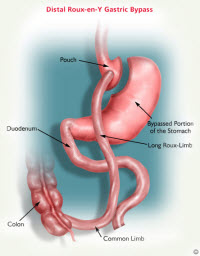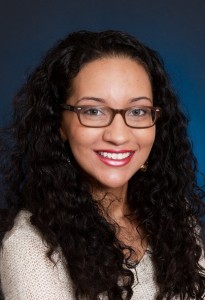 Let’s start with a few facts about the gastric bypass. It’s been around the longest period of time. If you know anyone who’s had gastric bypass, they lose weight fairly quickly. People are often very concerned about the speed of the weight loss. Speed of weight loss doesn’t matter. It’s all tied to body composition.. If you’re losing weight quickly and it’s all fatty tissue, than the faster the better. On the other hand, if you’re losing weight quickly but it’s lean body mass, that’s not so great. You’re going to get more and more tired and weaker and weaker. You’re slowing your metabolism down which will make it much harder to lose weight and easier to gain weight. No matter what, if you have gastric bypass, you’re going to lose weight fast. We refer to gastric bypass as being restrictive and malabsorptive. Restrictive means we’re making your stomach smaller. If we make you a smaller stomach, you can’t eat very much. You’re going to lose weight. The concept is simple. We make your stomach about the size of an egg. People often wonder if their stomach is going to stretch out. The answer is yes. We know it’s going to stretch out and we want it too. We don’t want your stomach the size of an egg. What we’re shooting for long term with all these operations is meal size, that being a small plate. That’s where we want to go. But, we’re working with stretchy material just like your skin is stretchy. If we make your stomach meal size small plate it would stretch way out. A normal size stomach can hold about 2-3 liters. We have to make your stomach tiny to begin with knowing that it’s going to stretch out.
Let’s start with a few facts about the gastric bypass. It’s been around the longest period of time. If you know anyone who’s had gastric bypass, they lose weight fairly quickly. People are often very concerned about the speed of the weight loss. Speed of weight loss doesn’t matter. It’s all tied to body composition.. If you’re losing weight quickly and it’s all fatty tissue, than the faster the better. On the other hand, if you’re losing weight quickly but it’s lean body mass, that’s not so great. You’re going to get more and more tired and weaker and weaker. You’re slowing your metabolism down which will make it much harder to lose weight and easier to gain weight. No matter what, if you have gastric bypass, you’re going to lose weight fast. We refer to gastric bypass as being restrictive and malabsorptive. Restrictive means we’re making your stomach smaller. If we make you a smaller stomach, you can’t eat very much. You’re going to lose weight. The concept is simple. We make your stomach about the size of an egg. People often wonder if their stomach is going to stretch out. The answer is yes. We know it’s going to stretch out and we want it too. We don’t want your stomach the size of an egg. What we’re shooting for long term with all these operations is meal size, that being a small plate. That’s where we want to go. But, we’re working with stretchy material just like your skin is stretchy. If we make your stomach meal size small plate it would stretch way out. A normal size stomach can hold about 2-3 liters. We have to make your stomach tiny to begin with knowing that it’s going to stretch out.
The second part is the malabsorptive part. That’s where the bypass comes in. We’re going to bypass the part of the stomach called the excluded portion. We go to the very beginning of the small intestine and divide it and pull it up and hook it into that tiny stomach so that we bypass the rest of the stomach. Whenever we bypass any portion of the intestinal tract, you’re not going to absorb things perfectly. You don’t absorb all the calories that you eat. But, you also don’t absorb some of the vitamins, minerals, and micronutrients quite as well either, which can be problematic. The surgery itself doesn’t take that long. It’s about 1 hour and 40 minutes. It can be done laparoscopically now. What we do is use long instruments and cameras and make little incisions on you. Recovery is pretty quick. Hospital stay is pretty quick. Recovery can take a while because this is a big operation. Whenever we start rearranging your anatomy, that’s a big operation. Recovery can take a good 4-6 weeks. Sometimes it can take up to 8 weeks to feel back to normal.
There are risks with every operation in the world. This is a bigger operation so the risks are bigger. When I talk about risk, I divide it into two time-frames. This is not something I made up. This is a medical standard which is basically right around surgery (peri-operative). By medical definition this means the first 30 days. The second time-frame is long-term which, by medical definition, means longer than 30 days. What’s the worst thing that could happen in that first 30 days? Could you die? The answer is yes it could happen. The risk of death is real when we start dividing your intestinal tract. It wouldn’t matter if I was talking about taking your appendix out or taking your colon out. When you look at national statistics, the risk is about 1: 200. What we see is about 1:500. Bottom line is that it may be rare, but not impossible. The things we worry about the most are infections. Some things are easy to treat such as urinary tract infections. Other infections aren’t so easy to treat such as pneumonia. They occur about 2% of the time after any surgery where you have to go to sleep for. You have to go to sleep for all these surgeries. It’s somewhat related to how long did the surgery take? The biggest fear as far as infections go is a leak on the inside. What if the pieces we took apart during surgery and put back together leaked? There are literally trillions of bacteria that live in the intestinal tract. When we start dividing the intestinal tract some of those bacteria could potentially get out. If they set up a rip-roaring infection, potentially you’d have to have another surgery to fix that. Wound infection means on the skin. They’re more of a nuisance than dangerous. They have to be treated with antibiotics. DVT is a deep venous thrombosis. PE is a pulmonary embolism. These are blood clots. You can get a blood clot without having surgery. You can get it from being dehydrated. One of the most common ways to get a blood clot is traveling on a long plane ride. You can also get it from having a general anesthetic. Again, it’s somewhat related to how long the surgery takes. The longer the surgery takes, the higher the risk is. We do all kinds of things to prevent that during surgery. The blood clot risk is 1-2%. If you got a blood clot you have to be on a blood thinner to dissolve that blood clot. The first thing that happens to that tiny stomach is the tissue swells up. Just like if you sprained your ankle. Your ankle would swell up. Stuff just trickles through the stomach initially. If you’re not able to stay hydrated you have to come back to the hospital to get IV fluids. You have to rest for a few days.
Long-term means 30 days until forever. The most common long term physical problem is peptic ulcer. You can get an ulcer without having gastric bypass. But when you have the anatomy of gastric bypass, the risk of getting an ulcer goes up. The people who tend to get ulcers are smokers and people who take anti-inflammatory meds. Ulcers just need to be treated. Something that could require another surgery is a bowel obstruction. Adhesion means scar tissue. If you’ve had any surgery on your abdomen you’re going to have scar tissue, not only on the outside, but also on the inside. That scar tissue can potentially kink the intestine. Just like a kind in a hose, nothing is going through there. You then have to go back to the operating room. Hernias are another risk. You can get them without having surgery. Any place we make an incision there is potentially a weaker spot. Stenosis means narrowing. What we’re talking about is right where we take the stomach and hook the small intestine to it. A scar could potentially form and cause a narrowing. If this happened, stuff wouldn’t go through very well. We would send you to a gastroenterologist. They would take a look down there and can stretch it out. Typically it doesn’t need any surgery but it does need to be evaluated and treated. Vitamin and nutrient malnutrition is relatively common. You won’t be able to absorb things perfectly. You’re going to have to take some things long term in addition to taking a battery of tests every 6-12 months to make sure those things are staying where they should. That’s a forever thing. That doesn’t go away.
We see great results with gastric bypass. You’ll lose about 70% of what you were overweight. If you were 100 pounds overweight you’ll lose 70 pounds. If you’re 200 pounds overweight, you’ll lose about 140 pounds. That’s the average. Some people lose more, some people lose less. About 40% of people with gastric bypass regain most of their weight back. Overall the long term anatomical and nutritional problems, with relatively poor weight maintenance, make it difficult for me to recommend gastric bypass for most people.
What should you do? You need to decide what’s best for your unique situation. There is no right or wrong here. What I encourage you to do is give us a call and set up a 1:1 consultation to discuss the options. Let’s you and I sit down and go over your situation. Everybody’s situation is different. Give us a call at (757) 873-1880 or email us at [email protected].
 I have some final thoughts for you. Weight loss is the most important step you can make to improve your health!! There are so many medical problems that are directly related to weight loss. If we can control weight, we can control medical problems. If we can control all these medical problems it gives you the best chance of living a long, healthy life.
I have some final thoughts for you. Weight loss is the most important step you can make to improve your health!! There are so many medical problems that are directly related to weight loss. If we can control weight, we can control medical problems. If we can control all these medical problems it gives you the best chance of living a long, healthy life.
Watch the online seminar and give us a call (757-873-1880) and set up your 1:1 appointment. If weight is contributing to your health problems let us help you. I hope to see you very shortly here in the office.






 Cat Keller has a wealth of experience in marketing, e-marketing, advertising and customer service and manages our Weight Loss Nutritional Store. She is always planning something fun and exciting. special events, discounts, giveaways – it’s never a dull moment. She is happy to help you with questions you may have regarding our products or services. Cat is a graduate of William & Mary, where she studied Government/Pre-Law and minored in Marketing.
Cat Keller has a wealth of experience in marketing, e-marketing, advertising and customer service and manages our Weight Loss Nutritional Store. She is always planning something fun and exciting. special events, discounts, giveaways – it’s never a dull moment. She is happy to help you with questions you may have regarding our products or services. Cat is a graduate of William & Mary, where she studied Government/Pre-Law and minored in Marketing.